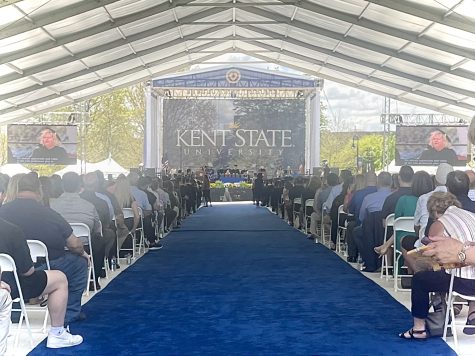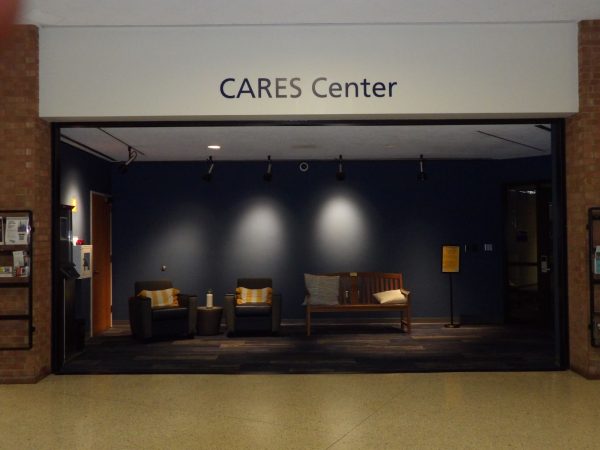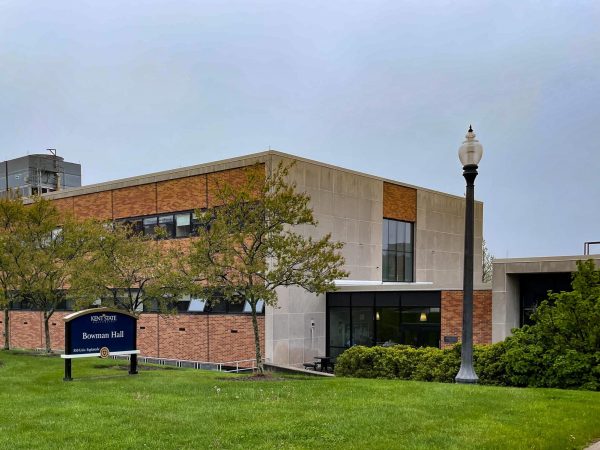AAUP has contract; AFSCME talks are ongoing
August 29, 2005
AAUP, KSU reach agreement after 13 months
Just in time for the start of school, the Kent State chapter of the American Association of University Professors and the university have finished 13 months of negotiations.
The talks stalled for most of the summer, and the AAUP — the faculty union — was in the midst of a strike authorization vote when agreement on a contract was reached.
The Board of Trustees met in a special session last week to approve collective bargaining agreements with two different units of the AAUP. Faculty members had approved the contracts in a vote counted on Aug. 18.
The agreements provide a 3 percent salary increase for each year of the three-year contract, which expires in August 2008. For tenure-track faculty, there will also be a retroactive adjustment in the base salary of 2 percent for the 2004-2005 school year that will be paid in one lump sum.
Tenured faculty are guaranteed near-lifetime employment and are expected to do more research and university service than non-tenure-track faculty, who emphasize teaching. The employment security is designed to preserve academic freedom.
The health-care provision requires all faculty to pay a premium for health insurance. Under the former contract, some members could choose a plan without premium.
Faculty now will choose between three plans in which they pay between 6 percent and 10 percent of the premium. Because the health-care plan is progressive, faculty members with higher incomes will pay a higher percentage of the premiums.
The agreements for both divisions of the AAUP include a vote on the fair-share fee. Fair share is a provision in which all faculty, both union and non-union, will pay a portion of their income to the AAUP for the benefits they receive from collective bargaining, AAUP president Cheryl Casper said.
The vote, which will be in November, will include all members of the collective bargaining unit. It must pass by 50 percent plus one vote to be enacted, Associate Provost Gayle Ormiston said.
During the summer, the tenure-track faculty considered a strike when negotiations with the university stalled. AAUP membership had voted 312-22 to reject an earlier version of the collective bargaining agreement.
Casper said the AAUP had come to a point in the negotiations where there was no other choice.
“At that point, we felt we had very few options,” she said. “When the university continuously says, ‘This is our last, best and final offer,’ it gave us very few options other than a strike.”
The main reason for rejecting the contract was a “cost pass through provision” in the health care plan, Casper said. The plan would have required faculty to pay half of any premium increase over 10 percent.
Strike ballots were sent out on July 6, but they were discarded as part of a provision in the collective bargaining unit.
Casper said the negotiations were more prolonged than any she could remember.
There will be a two-year break before contract negotiations begin again, said Casper, who will use the extra time to concentrate on her classes and research.
Although Ormiston said he enjoys the give and take of bargaining, he probably won’t have time to miss negotiations.
“I’ve got a whole other job to do at the provost’s office.” he said. “Don’t worry about me. I’ll be busy.”
Contact academic affairs reporter Amanda Garrett at [email protected].
























